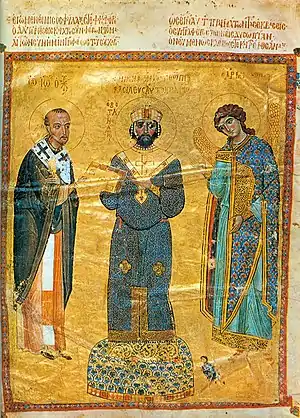1078
Year 1078 (MLXXVIII) was a common year starting on Monday (link will display the full calendar) of the Julian calendar.
| Millennium: | 2nd millennium |
|---|---|
| Centuries: | |
| Decades: | |
| Years: |
| 1078 by topic |
|---|
| Leaders |
|
| Birth and death categories |
| Births – Deaths |
| Establishments and disestablishments categories |
| Establishments – Disestablishments |
| Gregorian calendar | 1078 MLXXVIII |
| Ab urbe condita | 1831 |
| Armenian calendar | 527 ԹՎ ՇԻԷ |
| Assyrian calendar | 5828 |
| Balinese saka calendar | 999–1000 |
| Bengali calendar | 485 |
| Berber calendar | 2028 |
| English Regnal year | 12 Will. 1 – 13 Will. 1 |
| Buddhist calendar | 1622 |
| Burmese calendar | 440 |
| Byzantine calendar | 6586–6587 |
| Chinese calendar | 丁巳年 (Fire Snake) 3774 or 3714 — to — 戊午年 (Earth Horse) 3775 or 3715 |
| Coptic calendar | 794–795 |
| Discordian calendar | 2244 |
| Ethiopian calendar | 1070–1071 |
| Hebrew calendar | 4838–4839 |
| Hindu calendars | |
| - Vikram Samvat | 1134–1135 |
| - Shaka Samvat | 999–1000 |
| - Kali Yuga | 4178–4179 |
| Holocene calendar | 11078 |
| Igbo calendar | 78–79 |
| Iranian calendar | 456–457 |
| Islamic calendar | 470–471 |
| Japanese calendar | Jōryaku 2 (承暦2年) |
| Javanese calendar | 982–983 |
| Julian calendar | 1078 MLXXVIII |
| Korean calendar | 3411 |
| Minguo calendar | 834 before ROC 民前834年 |
| Nanakshahi calendar | −390 |
| Seleucid era | 1389/1390 AG |
| Thai solar calendar | 1620–1621 |
| Tibetan calendar | 阴火蛇年 (female Fire-Snake) 1204 or 823 or 51 — to — 阳土马年 (male Earth-Horse) 1205 or 824 or 52 |

Nikephoros III (middle) (c. 1002–1081)
Events
Byzantine Empire
- Spring – Nikephoros Botaneiates, a Byzantine general (strategos) of the Theme of the Anatolics, revolts against Emperor Michael VII (Doukas). With the support of the Seljuk Turks who provide him with troops, Nikephoros marches upon Nicaea (modern Turkey). He defeats the imperial army and proclaims himself emperor.
- March 24 – Nikephoros Botaneiates enters Constantinople in triumph and is crowned by Patriarch Cosmas I as emperor Nikephoros III of the Byzantine Empire. Michael VII resigns his throne after a 7-year reign and retires into the Monastery of Stoudios.[1]
- Battle of Kalavrye: The imperial forces of General Alexios Komnenos are victorious over the rebellious army (12,000 men) under Nikephoros Bryennios (the Elder), governor (doux) of the Theme of Dyrrhachium. Bryennios is captured and later blinded.
- Philaretos Brachamios abandons his claim to the Byzantine throne, on being appointed governor of Antioch, a foundation of the later Armenian Kingdom of Cilicia.
Europe
- August 7 – Battle of Mellrichstadt: Emperor Henry IV defeats the German anti-king Rudolf of Rheinfelden, duke of Swabia, near Mellrichstadt (modern Germany).
- October 3 – Grand Prince Iziaslav I dies, and is succeeded by Vsevolod I, who unites the principalities – Kiev, Chernigov and Pereyaslavl – in Kievan Rus'.[2]
England
- The White Tower of the Tower of London is begun, under the direction of Gundulf (or Gundulph), bishop of Rochester (approximate date).
Africa
- The Almoravid emir, Yusuf ibn Tashfin, besieges Ceuta. Since the city can receive help from the sea, the siege will last until 1083.
China
- By this year, the iron industry in the Song Dynasty is producing a total weight of 127,000,000 kg (125,000 t) of iron product per year.
Religion
- July 11 – The Romanesque tympanum of Santiago de Compostela Cathedral in Galicia (modern Spain) is constructed.
- Anselm is elected abbot of Bec Abbey, in Normandy.[3]
- A church council in Poitiers deposes Bishop Sylvester of Rennes who had bought his office in 1076. This leads also to the flight of Robert of Arbrissel to Paris where he begins his studies.[4]
Births
- March 17 – Abdul Qadir Gilani, Persian preacher (d. 1166)
- Alexander I (the Fierce), king of Scotland (d. 1124)
- Al-Mustazhir, Abbasid caliph in Baghdad (d. 1118)
- Constance of France, princess of Antioch (d. 1125)
- Ermengol V, count of Urgell (Catalonia) (d. 1102)
- Fujiwara no Tadazane, Japanese nobleman (d. 1162)
- Ibn Quzman, Moorish poet and writer (d. 1160)
- Reishi, Japanese empress consort (d. 1144)
Deaths
- February 20 – Herman, bishop of Salisbury
- May 30 – Gleb Svyatoslavich, Kievan prince
- August 9 – Peter I, Italian nobleman
- August 26 – Herluin, founder of Bec Abbey
- October 3
- Boris Vyacheslavich, prince of Chernigov
- Iziaslav I, Grand Prince of Kiev (b. 1024)
- November 6 – Berthold II, duke of Carinthia
- November 11 – Udo, archbishop of Trier
- Abd al-Qahir al-Jurjani, Persian scholar
- Andreas (or Andrew), archbishop of Bari
- Atsiz ibn Uvaq, Turkish emir of Damascus (or 1079)
- Immilla of Turin, Italian noblewoman
- Mu'ayyad fi'l-Din al-Shirazi, Fatimid scholar (b. 1000)
- Nikephoritzes, Byzantine governor
- Rhys ab Owain, king of Deheubarth
- Richard I (Drengot), prince of Capua
- Tunka Manin, ruler of the Ghana Empire (b. 1010)
- Zeng Gongliang, Chinese scholar and writer (b. 998)
- Zhang Xian, Chinese poet and writer (b. 990)
References
- John Julius Norwich (1991). Byzantium: The Apogee, p. 361. ISBN 0-394-53779-3.
- Martin, Janet (1993). Medieval Russia, 980–1584, pp. 33–35. Cambridge University Press. ISBN 978-0-521-67636-6.
- Dehsen, Christian D. Von; Harris, Scott L. (1999). Philosophers and Religious Leaders. Greenwood Publishing Group. p. 10. ISBN 9781573561525.
- Müller, Annalena (2021). From the Cloister to the State: Fontevraud and the Making of Bourbon France, 1642-1100. Routledge. p. 39. ISBN 9781000436297. Retrieved March 6, 2023.
This article is issued from Wikipedia. The text is licensed under Creative Commons - Attribution - Sharealike. Additional terms may apply for the media files.